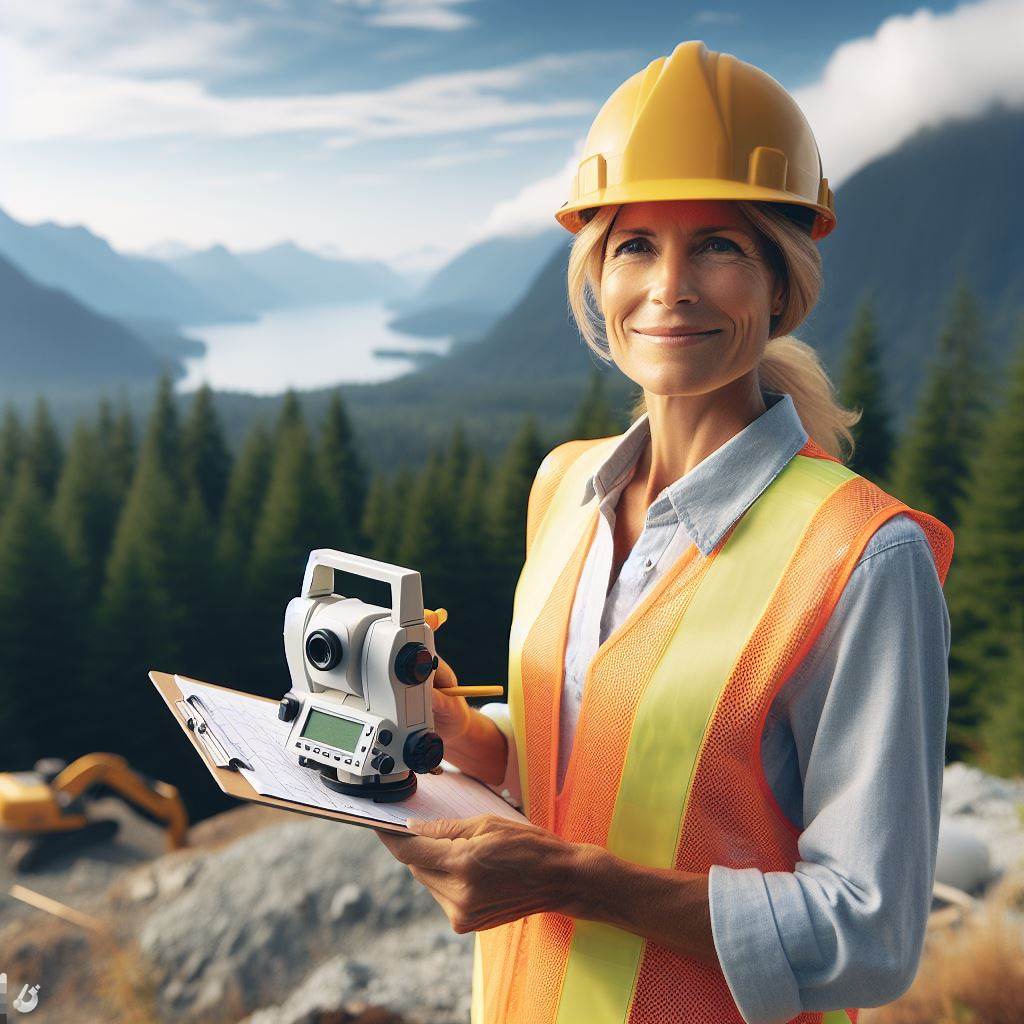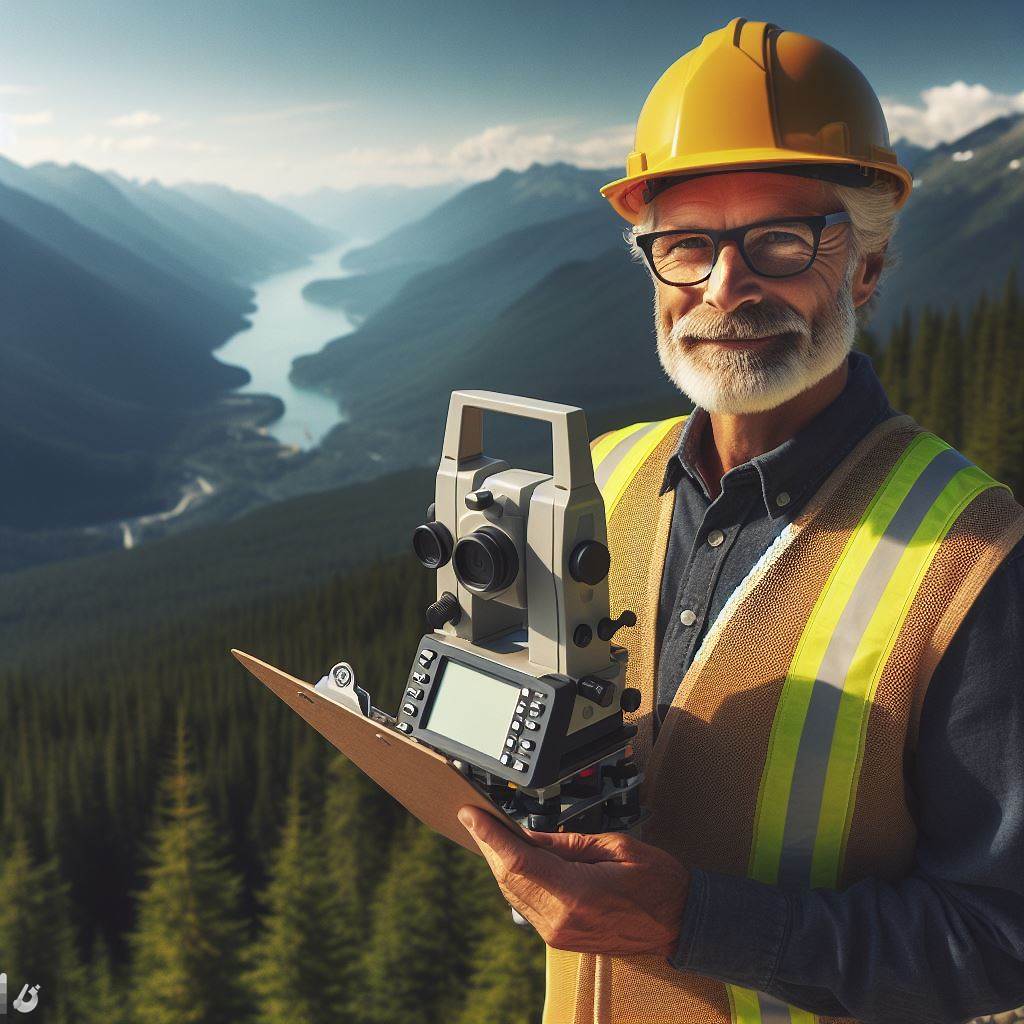Introduction
In the field of surveying in Canada, career paths hold significant importance for professionals.
Having a clear trajectory is crucial for surveyors as it helps them achieve their goals and grow in their chosen field.
This blog section aims to shed light on the various career paths available for surveyors in Canada, providing valuable insights and guidance.
Whether you are just starting your surveyor journey or looking to advance in your current role, this post is designed to help you navigate the possibilities and make informed decisions.
By exploring the diverse pathways within the surveying industry, you can gain a better understanding of the options available to you and the steps needed to reach your desired professional destination.
From exploring different specializations to considering the requirements for certification and licensure, this post will serve as a comprehensive guide for surveyors seeking career advancement.
With a focus on the active voice, concise sentences will ensure that the information is clear and easily understandable.
By the end of this post, you will have a solid foundation to make informed decisions and chart your path towards a successful surveying career in Canada.
Overview of Surveying as a Profession in Canada
In Canada, surveying is a crucial profession that involves measuring and mapping the Earth’s surface.
Definition and Significance of Surveying
Surveying is the science and art of determining the relative positions of different points on the Earth’s surface.
It plays a significant role in various fields and industries, including construction, engineering, land development, and urban planning.
Through accurate measurements and mapping, surveyors provide essential data for design, analysis, and decision-making processes.
They ensure the proper alignment and elevation of structures, boundaries, roads, and utilities.
Surveying helps in the creation and maintenance of property boundaries, providing legal certainty to landowners.
Additionally, surveying is vital for disaster management, environmental preservation, and resource exploration.
Demand for Surveyors in Canada
Canada’s vast landscape and ongoing development projects generate a high demand for qualified surveyors.
The construction and infrastructure sectors heavily rely on surveying services for accurate planning and execution.
Surveyors are needed to conduct topographic surveys, ensuring proper site selection, layout, and foundation stability.
As urban centers expand, surveyors play an essential role in urban planning, helping to manage growth and infrastructure requirements.
Furthermore, surveyors contribute to environmental assessments by mapping and monitoring ecosystems and natural resources.
In the mining and oil/gas industries, surveyors assist in determining land boundaries and surveying underground resources.
In short, surveying is a critical profession in Canada with diverse applications across multiple industries and fields.
It involves determining positions, measuring distances, and creating accurate maps, which aid in decision-making processes and ensure the proper alignment and development of structures.
Surveyors play a vital role in urban planning, construction, environmental preservation, and resource exploration.
Given the ongoing development projects and the need for infrastructure expansion, the demand for surveyors remains high in Canada.
Unlock Your Career Potential
Visualize a clear path to success with our tailored Career Consulting service. Personalized insights in just 1-3 days.
Get StartedThe profession continues to be an integral part of shaping the physical and environmental landscapes of the country.
Read: Canadian Surveyors’ Biggest Challenges in 2024
Types of Surveying Careers in Canada
The different career paths available for surveyors in Canada
Land Surveyor
Conducts boundary surveys, topographical surveys, and construction layout for various projects.
Requires a bachelor’s degree in surveying or related field and registration with the provincial surveying association.
Industries and sectors: construction, urban planning, real estate, and engineering firms.
Geodetic Surveyor
Measures and studies the Earth’s shape, gravity field, and other geodynamical phenomena.
Needs a strong background in geodesy, mathematics, and physics, and registration with the provincial surveying association.
Industries and sectors: natural resources, national mapping agencies, and environmental research organizations.
Hydrographic Surveyor
Surveys bodies of water to collect data on their contours, depths, and other features.
Requires a strong understanding of marine sciences, navigation, and cartography, and registration with the provincial surveying association.
Industries and sectors: marine exploration, offshore construction, port authorities, and environmental agencies.
Engineering Surveyor
Provides precise measurements and monitoring of construction sites, infrastructure, and engineering projects.
Needs a background in engineering, construction, and surveying, and registration with the provincial surveying association.
Industries and sectors: civil engineering, transportation, mining, and oil and gas.
Remote Sensing Surveyor
Collects and analyzes data from satellites, aerial photographs, and other remote sensing technologies.
Requires knowledge of geospatial analysis, image processing, and remote sensing techniques, and registration with the provincial surveying association.
Industries and sectors: environmental monitoring, agriculture, forestry, and urban planning.
In fact, there are various career paths available for surveyors in Canada.
Each path has its own responsibilities and requirements, but all require registration with the provincial surveying association.
Surveyors are needed in a range of industries and sectors, including construction, urban planning, engineering, natural resources, and environmental research.
Whether it’s measuring land boundaries, studying the Earth’s shape, or collecting data from remote sensing technologies, surveyors play a crucial role in shaping the physical and geographical landscape of Canada.
Read: Essential Skills Every Electrical Engineer Needs
Education and Certification Requirements
1. Educational Qualifications
To become a surveyor in Canada, you must meet the following educational qualifications:
- Obtain a bachelor’s degree in Geomatics Engineering, Surveying, or a related field.
- Complete coursework in mathematics, physics, geomatics, and land surveying principles.
- Acquire knowledge of computer-aided design (CAD) software and Geographic Information Systems (GIS).
- Gather field experience through internships or co-op programs.
2. Certification and Licensing Process
Becoming a certified and licensed surveyor in Canada involves the following steps:
- Apply for certification with a provincial surveying association, such as the Association of Canada Lands Surveyors (ACLS) or the Association of British Columbia Land Surveyors (ABCLS).
- Submit the necessary documentation, including educational transcripts, references, and work experience records.
- Pass the Association’s professional examinations, which assess your knowledge of surveying practices and regulations.
- Upon successful completion, you will be granted a Certificate of Registration or License to practice as a professional surveyor.
3. Importance of Ongoing Professional Development
Continuing education and professional development are critical for surveyors in Canada. Here’s why:
- Keep up-to-date with advancements in surveying technology, methodologies, and professional standards.
- Enhance your knowledge and skills to provide accurate and efficient surveying services.
- Improve your problem-solving abilities to tackle challenging projects.
- Meet the requirements set by surveying associations for license renewal and maintenance of professional status.
- Stay informed about changes in legislation, regulations, and industry practices.
A surveyor’s career is dynamic, and ongoing professional development ensures competence and credibility.
In essence, to become a surveyor in Canada, you need a bachelor’s degree in a relevant field, such as Geomatics Engineering or Surveying.
Certification and licensing involve applying to a surveying association, submitting required documents, and passing professional examinations.
Ongoing professional development is crucial to stay current and meet industry standards.
Read: The History of Land Surveying in Canada Explored

Navigating Surveyor Career Paths
Choosing the Right Career Path in Surveying
When it comes to surveying careers, it is important to make a well-informed decision. Here are some tips to help you choose the right career path in surveying:
- Evaluate your personal interests and skills to identify areas of surveying that align with your passions.
- Research the different types of surveying careers available in Canada to understand your options.
- Consider the level of education and qualifications required for each specific career path.
- Talk to experienced surveyors or professionals in the field to gain insights and advice.
- Attend industry events and conferences to network with surveying professionals and learn about their career journeys.
Factors to Consider
Before embarking on a surveying career path, it is crucial to consider the following factors:
- Salary and job prospects: Research the earning potential and job market demand for different surveying careers.
- Work environment: Determine if you prefer working outdoors or indoors, as surveying roles can vary in their working conditions.
- Personal growth and development opportunities: Look for career paths that offer continuous learning and professional growth.
- Industry trends and technology advancements: Stay updated on the latest trends and technological advancements in surveying.
- Work-life balance: Consider the work hours and flexibility offered in different surveying positions.
Tips for Networking and Exploring Job Opportunities
Networking and exploring job opportunities are essential steps in navigating your surveyor career path:
- Join professional organizations, such as the Canadian Institute of Geomatics, to connect with like-minded individuals.
- Attend industry conferences and seminars to meet potential employers and build your network.
- Utilize online platforms, such as LinkedIn, to connect with surveying professionals and stay updated on job opportunities.
- Participate in volunteer work or internships to gain practical experience and make valuable connections.
- Stay proactive and reach out to professionals in the field for informational interviews and mentorship opportunities.
Remember, navigating surveyor career paths requires patience, self-reflection, and dedication.
Take the time to research, network, and gain practical experience to make an informed decision about your surveying career. Good luck!
Read: Electrical Engineering Salaries in Canada: Facts
Challenges and Opportunities in Surveying Careers
Identifying the Challenges Faced by Surveyors in their Careers
- Limited job opportunities: The surveying industry in Canada is relatively small, resulting in fewer job openings.
- Competition: The limited job market leads to intense competition among surveying professionals.
- Technological advancements: Keeping up with rapidly evolving technology can be challenging for surveyors.
- Changing regulations: Surveyors must stay updated with changes in land surveying regulations and standards.
- Physical demands: Surveying often requires working in challenging outdoor environments and adverse weather conditions.
Potential Opportunities for Career Growth and Advancement
- Professional development: Continuous learning and acquiring new skills can open up avenues for career growth.
- Specialization: Surveyors can specialize in niche areas such as aerial surveying, geomatics, or construction surveying.
- Project management: Developing strong project management skills can lead to leadership roles and higher positions.
- Networking: Building a professional network within the surveying community can provide access to new opportunities.
- Entrepreneurship: Some surveyors choose to start their own surveying businesses, offering potential for growth and autonomy.
The Evolving Technology in Surveying and its Impact on Career Prospects
- Remote sensing technology: Advancements in satellite imagery and LiDAR have improved surveying accuracy and efficiency.
- Geographic Information Systems (GIS): GIS platforms allow surveyors to integrate and analyze spatial data more effectively.
- Robotic total stations: Automated measuring instruments improve productivity and reduce the need for manual labor.
- Drones: Unmanned aerial vehicles enable surveyors to conduct rapid and cost-effective aerial surveys.
- BIM and CAD software: Building Information Modeling (BIM) and Computer-Aided Design (CAD) software enhance surveying workflows.
In a nutshell, surveying careers in Canada offer both challenges and opportunities.
The limited job market and fierce competition can be difficult, but continuous professional development, specialization, and networking can lead to career growth and advancement.
Moreover, technological advancements in remote sensing, GIS, robotic instruments, drones, and software tools are reshaping the surveying profession, offering new possibilities for surveyors to excel in their careers.
Embracing these innovative technologies can enhance efficiency, accuracy, and job prospects for surveying professionals in Canada.
Conclusion
Navigating surveyor career paths in Canada can be an exciting and rewarding journey.
We discussed the importance of gaining relevant education and certification in the field.
Networking and building connections within the industry can open doors for new opportunities.
The different career paths available, such as land surveying, construction surveying, and hydrographic surveying, provide various avenues for surveyors to specialize and excel.
We encourage readers to explore these different paths and discover which area aligns with their interests and skills.
By staying informed about the latest advancements in technology and industry practices, surveyors can stay competitive and adaptable.
To further information and guidance, here are some additional resources to consider:
- The Canadian Institute of Geomatics (CIG) provides information on education, events, and publications related to surveying in Canada.
- The Association of Canada Lands Surveyors (ACLS) offers information on professional licensing and regulations for surveyors in Canada.
- The Government of Canada’s official website provides information on job prospects, requirements, and pathways for surveyor careers in the country.
We hope that this blog post has provided valuable insights and guidance for those interested in surveyor career paths in Canada.




